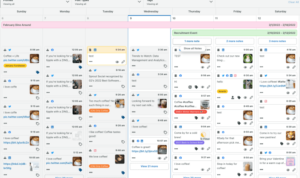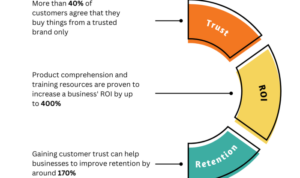Building a Referral Program takes center stage, inviting readers into a world of business growth through customer recommendations. Get ready to dive into the ins and outs of creating a successful referral program for your business.
Importance of Referral Programs
Referral programs are key for businesses looking to grow and expand their customer base. By incentivizing existing customers to refer friends and family, companies can tap into a new pool of potential customers without spending a fortune on traditional marketing strategies.
Benefits of Referral Programs
- Cost-effective way to acquire new customers without extensive advertising costs.
- Higher conversion rates as leads are coming from trusted recommendations.
- Builds brand loyalty and trust among customers who feel rewarded for their referrals.
Successful Companies with Referral Programs
- Uber: Known for its successful referral program offering discounts to both the referrer and the new user.
- Airbnb: Rewards users with travel credits for referring friends who book accommodations through the platform.
- Dropbox: Gained massive growth by offering extra storage space for users who referred others to sign up.
Designing a Referral Program

When it comes to designing a successful referral program, there are key components that need to be considered to ensure its effectiveness and appeal to both existing customers and potential referrals.
Rewards and Incentives
- One of the most crucial aspects of a referral program is determining the rewards and incentives offered to both the referrer and the new customer.
- It is essential to strike a balance between offering attractive rewards that motivate customers to refer others, while also ensuring that the program is sustainable for the business.
- Consider offering rewards such as discounts, free products or services, exclusive access to events, or even cash incentives.
Types of Referral Programs
- Tiered Rewards: In this type of program, customers receive increasing rewards as they refer more people.
- Cash Incentives: Offering monetary rewards for successful referrals can be a powerful motivator for customers.
- Exclusive Discounts: Providing exclusive discounts to both the referrer and the new customer can create a sense of exclusivity and value.
Implementing a Referral Program: Building A Referral Program
Launching a referral program can be a game-changer for your business. It can help you acquire new customers, increase brand awareness, and boost sales. Here’s a step-by-step guide on how to get started:
Setting Clear Goals and Tracking Metrics, Building a Referral Program
To ensure the success of your referral program, it’s crucial to set clear goals and track relevant metrics. Here are some important steps to follow:
- Define your objectives: Determine what you want to achieve with your referral program, whether it’s increasing sales, expanding your customer base, or improving customer loyalty.
- Set measurable goals: Establish specific, measurable targets that you can track over time to evaluate the effectiveness of your program.
- Identify key metrics: Determine the key performance indicators (KPIs) that will help you measure the success of your referral program, such as the number of referrals generated, conversion rates, and customer lifetime value.
- Use tracking tools: Implement tracking tools to monitor the performance of your program and make data-driven decisions to optimize its results.
Promoting Your Referral Program to Existing Customers
Getting your existing customers excited about your referral program is essential to its success. Here are some tips on how to effectively promote your program to them:
- Send personalized invitations: Reach out to your loyal customers with personalized messages inviting them to participate in the referral program.
- Offer incentives: Provide attractive incentives for both the referrer and the referee to encourage them to refer new customers to your business.
- Utilize multiple channels: Promote your referral program across various channels, such as email, social media, and your website, to reach a wider audience.
- Create engaging content: Develop compelling content that highlights the benefits of your referral program and makes it easy for customers to understand how it works.
Managing and Optimizing Referral Programs

When it comes to managing and optimizing a referral program, it is crucial to constantly monitor its performance and make necessary adjustments to ensure its effectiveness.
Importance of Monitoring and Optimizing
Monitoring and optimizing a referral program allows businesses to track the success of their program, identify areas for improvement, and maximize the return on investment. By analyzing data and feedback, companies can make informed decisions to enhance the program’s performance.
- Regularly review referral program metrics such as conversion rates, customer acquisition cost, and lifetime value to gauge its effectiveness.
- Collect feedback from both referrers and referees to understand their experience with the program and identify pain points or areas of improvement.
- Utilize A/B testing to experiment with different program incentives, messaging, or referral processes to optimize performance based on data-driven insights.
Analyzing Data and Feedback
When analyzing data and feedback to improve a referral program, businesses can gain valuable insights that drive strategic decision-making and enhance program effectiveness over time.
- Utilize analytics tools to track referral program performance metrics and identify trends or patterns that indicate areas for improvement.
- Segment referral data to understand which channels, incentives, or messaging strategies are most effective in driving referrals and customer acquisition.
- Act on feedback from participants to address any issues, refine program mechanics, and enhance the overall user experience to encourage more referrals.
Strategies for Enhancing Effectiveness
To continuously enhance the effectiveness of a referral program, businesses can implement various strategies that focus on optimizing program mechanics, increasing participation, and maximizing the impact of each referral.
- Offer tiered rewards or bonuses for referrers who consistently generate high-quality referrals to incentivize ongoing participation and engagement.
- Implement gamification elements such as leaderboards, badges, or challenges to make the referral process more interactive and engaging for participants.
- Encourage referrals through personalized outreach, targeted messaging, and exclusive offers to make the program more appealing and drive higher conversion rates.












